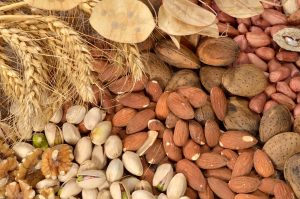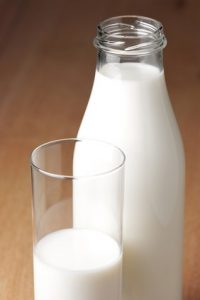Is It Dairy Or Diet?
Author: Dr. Stephen Chaney
 For years we have been told to select low fat dairy foods. But recent headlines claim, “That’s nonsense. Whole fat dairy foods are healthy.” Are those headlines true?
For years we have been told to select low fat dairy foods. But recent headlines claim, “That’s nonsense. Whole fat dairy foods are healthy.” Are those headlines true?
In previous issues of “Health Tips From the Professor” I have kept you abreast of recent studies suggesting that whole fat dairy foods may not be as bad for us as we thought. I also cautioned you that the headlines may not have accurately represented the studies they described.
Headlines have to be simple. But truth is often more nuanced. If we believed the current headlines, we might be asking ourselves questions like, “Should we ditch the current health guidelines recommending low-fat dairy foods? Are foods like ice cream, sour cream, and cheddar cheese actually be good for us?
To answer these questions, I will look at the study (A Mente et al, European Heart Journal, 44, 2560-2579, 2023) behind the current headlines and put the study into perspective.
Spoiler alert: If I could summarize the study findings in two sentences, they would be, “Whole fat dairy can be part of a healthy diet. But can it be part of an unhealthy diet?”
Stay tuned. I will discuss the science behind that statement below.
How Was This Study Done?
 This study started with data collected from the Prospective Urban Rural Epidemiology (PURE) study. The PURE study is an ongoing study correlating diet, lifestyle, and environmental effects on health outcomes. It has enrolled 166,762 individuals, age 35-70, from 21 low-, middle-, and high-income countries on 5 continents.
This study started with data collected from the Prospective Urban Rural Epidemiology (PURE) study. The PURE study is an ongoing study correlating diet, lifestyle, and environmental effects on health outcomes. It has enrolled 166,762 individuals, age 35-70, from 21 low-, middle-, and high-income countries on 5 continents.
Habitual food intake was determined using country-specific food frequency questionnaires at the time participants joined the study. Participants (166,762) from the PURE study who had complete dietary information were included in this study and were followed for an average of 9.3 years.
Based on preliminary analysis of data from the PURE study, the authors developed their version of a healthy diet, which they call the PURE diet. Like most other healthy diets, the PURE diet emphasizes fruits, vegetables, legumes, nuts, and fish. However:
- Based on studies suggesting that whole fat dairy foods can be part of a healthy diet, the PURE diet includes whole fat dairy foods.
This is different from most other healthy diet recommendations.
They went on to develop what they referred to as the PURE healthy diet score by:
- Determining the median intake for each of the 6 food groups included in their PURE diet (fruits, vegetables, legumes, nuts, fish, and whole fat dairy).
- Assigning each participant in the study a score of 0 or 1 depending on whether their intake for that food group was below or above the median intake.
- Adding up the points. Since 6 food groups were included in the PURE diet, this means that each participant in the study was assigned a PURE diet score ranging from 0-6.
Once they had developed a PURE diet score, they expanded their data by including five additional large independent studies that included people from 70 countries. The combined data from all six studies amounted to 245,597 people from 80 countries. Of the people included in the data analysis:
- 21% came from high income countries.
- 60% came from middle income countries.
- 19% came from low-income countries.
This is very similar to the global population distribution. This is a strength of this study because it allowed them to ask whether the PURE diet score worked as well in low-income countries as in high-income countries.
Finally, they correlated the PURE diet score with outcomes like all-cause mortality, heart attack, and stroke.
Is Whole Fat Dairy Healthy?
 The authors of this study divided the participants of all 6 studies into quintiles based on their PURE diet score and compared those in the highest quintile (PURE score of ≥ 5) with those in the lowest quintile (PURE score of ≤ 1).
The authors of this study divided the participants of all 6 studies into quintiles based on their PURE diet score and compared those in the highest quintile (PURE score of ≥ 5) with those in the lowest quintile (PURE score of ≤ 1).
The people in the highest quintile were eating on average 5 servings/day of fruits and vegetables, 0.5 servings/day of legumes, 1.2 servings/day of nuts, 0.3 servings/day of fish, 2 servings/day of dairy (of which 1.4 servings/day was whole fat dairy), 0.5 servings/day of unprocessed red meat, and 0.3 servings/day of poultry.
The people in the lowest quintile ate significantly less fruits, vegetables, nuts, fish, and dairy; and slightly less legumes, unprocessed red meat, and poultry than those in the highest quintile.
However, they consumed significantly more refined wheat foods and white rice. This study did not track consumption of highly processed foods, but the high consumption of white flour leads me to suspect they ate a lot more highly processed food.
With that in mind, when the authors compared people with the highest PURE diet scores to those with the lowest PURE diet scores:
- All-cause mortality was reduced by 30%.
- Cardiovascular disease was reduced by 18%.
- Heart attacks were reduced by 14%.
- Strokes were reduced by 19%.
- The PURE healthy eating score was slightly better at predicting health outcomes than the Mediterranean, DASH, and HEI (Healthy Eating Index) scores. But the differences were small. So, I still recommend choosing the healthy diet that best fits your preferred foods and your lifestyle.
- The PURE healthy eating score was significantly better at predicting health outcomes than the Planetary diet score. I will discuss the nutritional inadequacy of “sustainable diets” like the Planetary diet in next week’s “Health Tips From the Professor” article.
Because of the size and design of this study, they were able to make three interesting observations.
- The PURE, Mediterranean, DASH, and HEI diet scores were predictive of health outcomes in every country across the globe. You no longer have to wonder if what works in the United States will work in low-income countries and in countries with very different food preferences. Previous studies have not been able to make that claim.
2) You don’t have to be perfect.
-
- A 20% increase (one quintile) in PURE score was associated with a 6% lower risk of major cardiovascular events and an 8% lower risk of mortality. In other words, even small improvements in your diet may improve your health outcomes.
-
- The health benefits of the PURE diet started to plateau at a score of 3 (with 6 being the highest score). The authors concluded that most of the health benefits were associated with a modestly higher consumption of healthy foods compared to little or no consumption of healthy foods.
Simply put, that means the health benefits gained by going from a moderately healthy diet to a very healthy diet are not as great as the health benefits gained by going from a poor diet to a moderately healthy diet.
[Note: There are still improvements in health outcomes when you go from a moderately healthy diet to a very healthy diet. My recommendation: “You don’t need to achieve perfection, but you shouldn’t accept mediocrity”.]
3) The PURE diet score was more predictive of health outcomes in some countries than in others.
-
- The PURE diet score was more predictive of health outcomes in low-income countries. The authors felt that was because low-income countries started with average PURE scores of 2.1, whereas higher-income countries started with average PURE scores of 3.5.
The authors felt this was another example getting more “bang for the buck” by going from a poor diet to a moderately healthy diet than from a moderately healthy diet to a very healthy diet. (Remember, the health benefits associated with improving PURE diet scores start to plateau at a PURE score of 3.
-
- The difference in benefits for low-income countries compared to high-income countries was observed for the Mediterranean, DASH, and HEI diet scores. So, it is probably safe to say for any healthy diet you don’t need to be perfect. You just need to be better.
The authors concluded, “A diet composed of higher amounts of fruit, vegetables, nuts, legumes, fish, and whole fat dairy is associated with a lower risk of cardiovascular disease and mortality in all world regions, especially in countries with lower income where consumption of these foods is low.”
Is It Dairy Or Diet?
 The headlines are telling us that recommendations to choose low-fat dairy products are out of date. They say there is no reason to fear whole fat dairy foods. They are good for you. Bring on the ice cream, sour cream, cream cheese, and high fat hard cheeses!
The headlines are telling us that recommendations to choose low-fat dairy products are out of date. They say there is no reason to fear whole fat dairy foods. They are good for you. Bring on the ice cream, sour cream, cream cheese, and high fat hard cheeses!
As usual, there is a kernel of truth in the headlines, but headlines have to be simple. And the latest headlines are an oversimplification of what the studies actually show. Let me provide perspective to the headlines by asking two questions.
#1: Is it dairy or diet? A major weakness of this and similar studies is that they fail to consider diet context. What do I mean by that? Let’s dig a little deeper into this study.
- Let’s start with a description of the PURE diet. It is a diet that emphasizes fruits, vegetables, legumes, nuts, and fish. In other words, it is a primarily plant-based diet.
- Although the authors keep referring to the diet as one that includes whole fat dairy. It would be more accurate to say that it includes dairy, which was 30% low-fat and 70% whole fat.
- The authors said that removal of any one food group from this combination reduced the predictive power of the PURE diet. In other words, the beneficial effect of 70% whole fat dairy is best seen in the context of a primarily plant-based diet.
- The PURE diet was most effective at predicting health outcomes in low-income countries where a significant percent of the population consumes a primarily plant-based diet because meats are expensive.
So, a more accurate description of this study would be it shows that a mixture of low-fat and whole-fat dairy foods are a healthy addition to a primarily plant-based diet. But that is too complicated for a headline.
#2: If whole fat dairy can be part of a healthy diet, can it also be part of an unhealthy diet?
To answer that question let’s compare the potential effects of whole fat dairy on a primarily plant-based diet compared to the typical American or European diet.
- Milk and other dairy foods are excellent sources of calcium, vitamin B12, and iodine and good sources of protein, vitamin D, choline, zinc, and selenium – nutrients that are often low or missing in plant-based diet. And this is true whether the dairy foods are low-fat or whole fat.
- Primarily plant-based diets tend to be low in saturated fat, so the potential negative effects of adding a small amount of saturated fat to the diet may be outweighed by the beneficial effects of the nutrients dairy foods provide.
On the other hand,
- The typical American or European diet provides plenty of protein and vitamin B12 and significantly more choline, vitamin D, iodine, and zinc than a plant-based diet. The added nutrients from adding dairy foods to this kind of diet is still beneficial, but the benefits are not as great as adding dairy foods to a primarily plant-based diet.
- If you read the American Heart Association statement on saturated fats, it does not say that any amount of saturated fat is bad for you. In fact, small amounts of saturated fats play some beneficial roles in our bodies. The American Heart Association says, “Eating too much saturated fat can raise the level of LDL cholesterol in your blood…[which] increases your risk of heart disease and stroke.”
- Here is where the problem lies. The typical American or European diet already contains too much saturated fat. Whole fat dairy just adds to that excess.
So, the most accurate description of this study would be it shows that a mixture of low-fat and whole-fat dairy foods are a healthy addition to a primarily plant-based diet but may not be a healthy addition to the typical American diet. But that is way too complicated for a headline.
You are probably wondering what this means for you. Here are my recommendations.
If you eat like most Americans, you should continue to follow the current health guidelines to choose low-fat dairy foods.
If you happen to be among the few Americans who eat a primarily plant-based diet, you will probably benefit by adding a mixture of low-fat and whole fat dairy foods to your diet.
The Bottom Line
Once again, the headlines are telling us that recommendations to choose low-fat dairy products are out of date. The articles say there is no reason to fear whole fat dairy foods. They are good for you. Bring on the ice cream, sour cream, cream cheese, and high fat hard cheeses!
As usual, there is a kernel of truth in the headlines, but headlines have to be simple. And the latest headlines are an oversimplification of what the studies actually show. In this post I looked at the study behind the most recent headlines and provided perspective to the headlines by asking two questions.
#1: Is it dairy or diet? A major weakness of this and similar studies is that they fail to consider diet context.
When you consider diet context a more accurate description of this study would be it shows that a mixture of low-fat and whole-fat dairy foods are a healthy addition to a primarily plant-based diet. But that is too complicated for a headline.
#2: If whole fat dairy can be part of a healthy diet, can it also be part of an unhealthy diet?
When you consider that question the most accurate description of this study would be it shows that a mixture of low-fat and whole-fat dairy foods are a healthy addition to a primarily plant-based diet but may not be a healthy addition to the typical American diet. But that is way too complicated for a headline.
You are probably wondering what this means for you. Here are my recommendations.
If you eat like most Americans, you should continue to follow the current health guidelines to choose low-fat dairy foods.
If you happen to be among the few Americans who eat a primarily plant-based diet, you will probably benefit by adding a mixture of low-fat and whole fat dairy foods to your diet.
For more information on this study, and the science behind my summary of the study, read the article above.
These statements have not been evaluated by the Food and Drug Administration. This information is not intended to diagnose, treat, cure, or prevent any disease.
_________________________________________________________________________
My posts and “Health Tips From the Professor” articles carefully avoid claims about any brand of supplement or manufacturer of supplements. However, I am often asked by representatives of supplement companies if they can share them with their customers.
My answer is, “Yes, as long as you share only the article without any additions or alterations. In particular, you should avoid adding any mention of your company or your company’s products. If you were to do that, you could be making what the FTC and FDA consider a “misleading health claim” that could result in legal action against you and the company you represent.
For more detail about FTC regulations for health claims, see this link.
https://www.ftc.gov/business-guidance/resources/health-products-compliance-guidance















